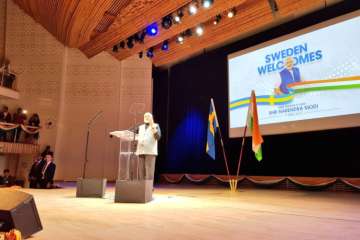In last four years, govt worked hard for building developed, inclusive India: PM Modi at Stockholm University
In a special gesture, Modi made the gathering give a standing ovation to Swedish Prime Minister Stefan Lofven who was also present on the occasion.

Prime Minister Narendra Modi today said that India is going through a period of change and the government in the last four years has worked towards building a developed and inclusive country, Prime Minister Narendra Modi said here tonight.
Addressing the Indian diaspora at the Stockholm University here, Modi said earlier removing poverty was limited to just words and slogans, but his government was committed to poverty alleviation and was using empowerment as a tool to achieve its goal.
"The country is going through a period of change. Presently, there is a government in India which for the country's prestige, self-respect and taking it to new heights in the 21st century, is working day and night," Modi said amidst loud cheers from the audience.
"In the last four years, the government has worked for building a developed and inclusive India. It has worked for creating a New India by 2022," the prime minister said.
In a special gesture, Modi made the gathering give a standing ovation to Swedish Prime Minister Stefan Lofven who was also present on the occasion.
Lofven said Sweden highly values its partnership with India. He lauded the Indian diaspora for its contribution to the Nordic country.
Lofven said his talks with Prime Minister Modi today had helped the bilateral partnership take a "great step forward".
Modi, in his address, asserted that India's stature has increased at the world stage.
"Be it Africa or small Pacific countries, or ASEAN or Europe or Asia, all of them are looking at India as a trusted friend," he said.
He cited India's entry into the export control regimes of Wassenaar Arrangement, the Australia Group and the Missile Technology Control Regime (MTCR), as an example of India's increasing stature at the global stage.
Modi also said that in India, the government is using technology for accountability and transparency.
Digital infrastructure has changed how citizens used to interact with the government. Reaching out to the government has now become a practice rather than a privelage, he said.
Modi said the perception about the way the govt functions was changing.
It is easier to do business in India and the country has jumped 42 ranks in ease of doing business index, Modi said.
He also hailed the government's move of implementing the GST, saying the "historic" reform in the indirect tax regime is being increasingly adopted by the industrial sector.
In his address, he also said that the Jan Dhan Yojna, Aadhaar and mobile technology had merged to create direct benefit transfer facility.
These were allowing welfare schemes to reach their intended targets and had saved USD 12 billion from ending up in wrong hands, Modi said.
The prime minister also stressed on the government's focus on ease of living and mentioned the 'Ayushman Bharat' -- the world's largest health care insurance scheme -- as an example of it.
He also invoked the achievements of pugilist M C Mary Kom and shuttler Saina Nehwal at the Commonwealth Games in Australia earlier this month. “The achievements of Mary Kom and Saina Nehwal make our hearts swell in pride,” said PM Modi.
Earlier in the day, Modi and Lofven held a bilateral summit following which India and Sweden signed a Joint Action Plan and an Innovation Partnership for Sustainability of the Future.
India and Sweden also co-hosted the first ever India-Nordic Summit in which the Prime Ministers of Denmark, Iceland, Norway, and Finland also participated.
Modi arrived here on Monday evening on the first leg of his three-nation tour to Europe that will also see him going to Britain and Germany.
This is the first prime ministerial visit from India to Sweden in 30 years after the visit of then Prime Minister Rajiv Gandhi in 1988.
Sweden supports India’s bid for NSG membership
Sweden today backed India's bid for membership of the Nuclear Suppliers Group (NSG) as it welcomed New Delhi's recent accession to the international export control regimes, including Wassenaar Arrangement and Missile Technology Control Regime.
Swedish Prime Minister Stefan Lofven expressed his country's support to India during his talks with Prime Minister Narendra Modi here.
India's membership to the 48-member elite nuclear club is being primarily opposed by China on the pretext that it is not a signatory to the Non-Proliferation Treaty.
Out of the four export control regimes that work to keep proliferation of Weapons of Mass Destruction (WMD) in check, India is a member of the Missile Technology Control Regime (MTCR), the Wassenaar Arrangement and the Australia Group.
"Prime Minister Lofven welcomed India's recent accession to the international export control regimes, including to Australia Group (AG), Wassenaar Arrangement (WA), Missile Technology Control Regime (MTCR), and The Hague Code of Conduct against Ballistic Missile Proliferation (HCOC), and expressed support for India's membership of the Nuclear Supplier Group (NSG)," according to Sweden-India Joint Action Plan.
Sweden also extended support to India's permanent membership of a reformed and expanded United Nations Security Council.
Prime Minister Modi thanked his Swedish counterpart for Sweden's support to India.
(With PTI inputs)